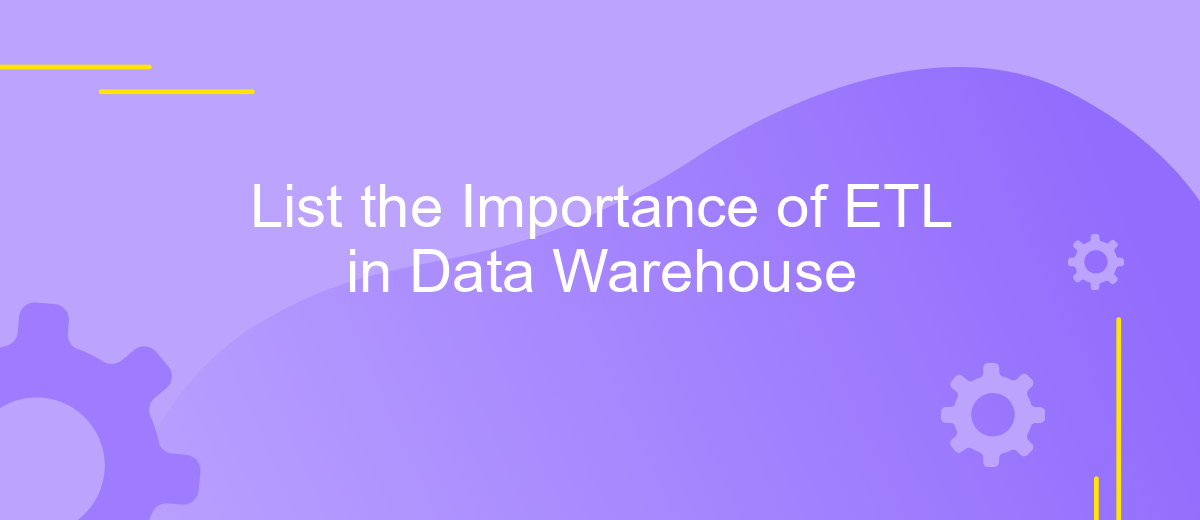List the Importance of ETL in Data Warehouse
Extract, Transform, Load (ETL) processes are crucial for the functionality and efficiency of data warehouses. They enable the seamless integration of data from multiple sources, ensuring that the information is clean, consistent, and ready for analysis. ETL processes not only enhance data quality but also improve decision-making capabilities by providing accurate and timely insights.
Introduction
ETL (Extract, Transform, Load) is a fundamental process in data warehousing, enabling businesses to consolidate data from various sources into a centralized repository. This process ensures that data is not only collected but also cleaned, transformed, and made ready for analysis, which is critical for informed decision-making.
- Data Extraction: Collecting data from different sources such as databases, APIs, and flat files.
- Data Transformation: Cleaning, filtering, and transforming data into a suitable format for analysis.
- Data Loading: Inserting the transformed data into a data warehouse for easy access and analysis.
By streamlining the ETL process, businesses can ensure data accuracy and consistency, which are crucial for analytics and reporting. Tools like ApiX-Drive can significantly simplify the integration and automation of data extraction and transformation, enhancing the overall efficiency of the ETL process. This not only saves time but also reduces the risk of errors, making ETL indispensable for effective data warehousing.
Data Extraction

Data extraction is the initial phase of the ETL process, where raw data is collected from various sources such as databases, APIs, flat files, and cloud services. This step is crucial as it ensures that all relevant data is gathered in a consistent and reliable manner. Proper extraction methods help in maintaining data integrity and quality, which are essential for accurate analysis and reporting in a data warehouse environment. By utilizing robust extraction techniques, organizations can ensure that they capture all necessary data points without any loss or corruption.
Integrating different data sources can be challenging, but tools like ApiX-Drive simplify this process by providing seamless integration capabilities. ApiX-Drive allows users to connect various applications and automate data extraction workflows, reducing manual effort and minimizing errors. This service supports a wide range of platforms, enabling businesses to efficiently gather data from multiple channels. By leveraging such tools, organizations can streamline their data extraction processes, ensuring timely and accurate data collection for their data warehouse.
Data Transformation

Data transformation is a critical phase in the ETL (Extract, Transform, Load) process within a data warehouse. This step involves converting raw data into a structured format that is suitable for analysis and reporting. It ensures that the data is clean, consistent, and usable for business intelligence purposes.
- Data Cleaning: This involves removing inaccuracies, duplicates, and inconsistencies from the data.
- Data Integration: Combining data from different sources into a unified format.
- Data Enrichment: Enhancing data quality by adding relevant information.
- Data Aggregation: Summarizing data to provide meaningful insights.
- Data Conversion: Changing data types and formats to match the target system requirements.
Tools like ApiX-Drive can significantly simplify the data transformation process by providing seamless integration capabilities. ApiX-Drive allows businesses to connect various data sources, automate data cleaning, and streamline the entire transformation process. This not only saves time but also ensures high data quality and reliability, making it easier for organizations to derive actionable insights from their data warehouses.
Data Loading

Data loading is a critical phase in the ETL (Extract, Transform, Load) process, where transformed data is loaded into the data warehouse. This step ensures that the data is available for analysis and reporting, making it accessible for business intelligence tools and end-users.
Efficient data loading requires careful planning and execution to maintain data integrity and performance. It involves selecting the appropriate loading strategy, such as full load, incremental load, or real-time load, depending on the specific requirements of the data warehouse and the nature of the data.
- Full Load: Loading the entire dataset from the source to the target.
- Incremental Load: Loading only the data that has changed since the last load.
- Real-Time Load: Continuously loading data as it is generated from the source.
Tools like ApiX-Drive can facilitate seamless data integration and automate the data loading process, ensuring that data is consistently updated and synchronized across systems. Leveraging such tools can significantly reduce manual efforts and minimize errors, thereby enhancing the overall efficiency of the data loading phase.


Conclusion
In conclusion, ETL (Extract, Transform, Load) processes are fundamental to the successful operation of a data warehouse. They ensure that data is accurately gathered from various sources, transformed into a usable format, and loaded into the data warehouse for analysis. This streamlined process not only enhances data quality and integrity but also enables more efficient and insightful data analysis, leading to better business decisions.
Moreover, modern integration services like ApiX-Drive can significantly simplify and automate the ETL process. By providing a user-friendly interface and robust functionality, ApiX-Drive allows businesses to easily set up and manage data integrations, ensuring that data is continuously updated and readily available for analysis. This reduces the manual effort involved and minimizes the risk of errors, ultimately contributing to a more efficient and reliable data warehousing solution.
FAQ
What is ETL and why is it important in a Data Warehouse?
How does ETL improve data quality in a Data Warehouse?
What are the challenges associated with the ETL process?
How can automation tools help in the ETL process?
What are the key benefits of a well-implemented ETL process in a Data Warehouse?
Time is the most valuable resource in today's business realities. By eliminating the routine from work processes, you will get more opportunities to implement the most daring plans and ideas. Choose – you can continue to waste time, money and nerves on inefficient solutions, or you can use ApiX-Drive, automating work processes and achieving results with minimal investment of money, effort and human resources.

